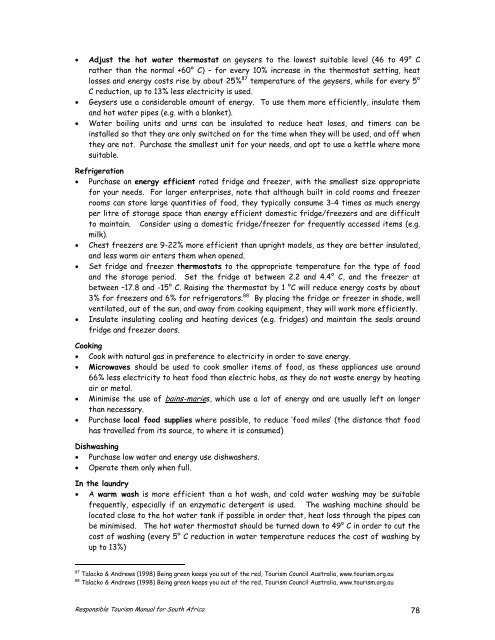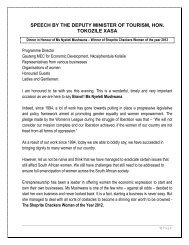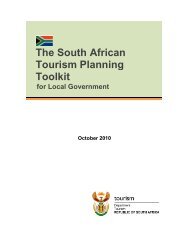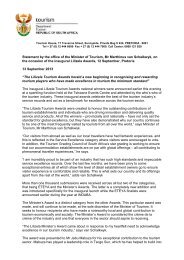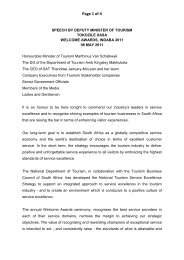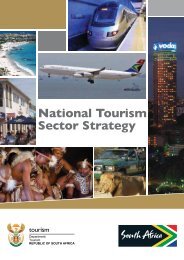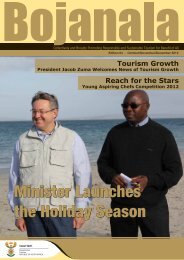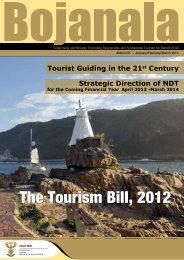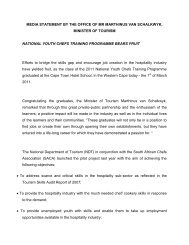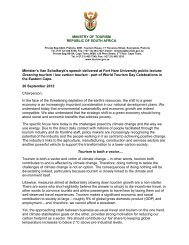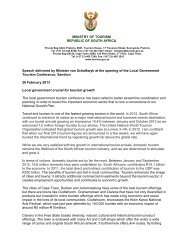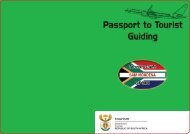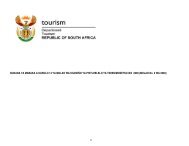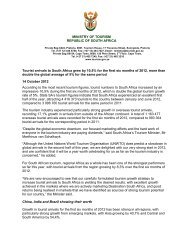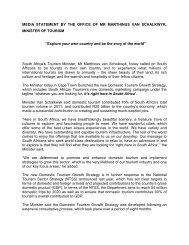Responsible Tourism Manual - Tourism Knowledge Portal
Responsible Tourism Manual - Tourism Knowledge Portal
Responsible Tourism Manual - Tourism Knowledge Portal
Create successful ePaper yourself
Turn your PDF publications into a flip-book with our unique Google optimized e-Paper software.
• Adjust the hot water thermostat on geysers to the lowest suitable level (46 to 49° C<br />
rather than the normal +60° C) – for every 10% increase in the thermostat setting, heat<br />
losses and energy costs rise by about 25% 87 temperature of the geysers, while for every 5°<br />
C reduction, up to 13% less electricity is used.<br />
• Geysers use a considerable amount of energy. To use them more efficiently, insulate them<br />
and hot water pipes (e.g. with a blanket).<br />
• Water boiling units and urns can be insulated to reduce heat loses, and timers can be<br />
installed so that they are only switched on for the time when they will be used, and off when<br />
they are not. Purchase the smallest unit for your needs, and opt to use a kettle where more<br />
suitable.<br />
Refrigeration<br />
• Purchase an energy efficient rated fridge and freezer, with the smallest size appropriate<br />
for your needs. For larger enterprises, note that although built in cold rooms and freezer<br />
rooms can store large quantities of food, they typically consume 3-4 times as much energy<br />
per litre of storage space than energy efficient domestic fridge/freezers and are difficult<br />
to maintain. Consider using a domestic fridge/freezer for frequently accessed items (e.g.<br />
milk).<br />
• Chest freezers are 9-22% more efficient than upright models, as they are better insulated,<br />
and less warm air enters them when opened.<br />
• Set fridge and freezer thermostats to the appropriate temperature for the type of food<br />
and the storage period. Set the fridge at between 2.2 and 4.4° C, and the freezer at<br />
between –17.8 and -15° C. Raising the thermostat by 1 °C will reduce energy costs by about<br />
3% for freezers and 6% for refrigerators. 88 By placing the fridge or freezer in shade, well<br />
ventilated, out of the sun, and away from cooking equipment, they will work more efficiently.<br />
• Insulate insulating cooling and heating devices (e.g. fridges) and maintain the seals around<br />
fridge and freezer doors.<br />
Cooking<br />
• Cook with natural gas in preference to electricity in order to save energy.<br />
• Microwaves should be used to cook smaller items of food, as these appliances use around<br />
66% less electricity to heat food than electric hobs, as they do not waste energy by heating<br />
air or metal.<br />
• Minimise the use of bains-maries, which use a lot of energy and are usually left on longer<br />
than necessary.<br />
• Purchase local food supplies where possible, to reduce ‘food miles’ (the distance that food<br />
has travelled from its source, to where it is consumed)<br />
Dishwashing<br />
• Purchase low water and energy use dishwashers.<br />
• Operate them only when full.<br />
In the laundry<br />
• A warm wash is more efficient than a hot wash, and cold water washing may be suitable<br />
frequently, especially if an enzymatic detergent is used. The washing machine should be<br />
located close to the hot water tank if possible in order that, heat loss through the pipes can<br />
be minimised. The hot water thermostat should be turned down to 49° C in order to cut the<br />
cost of washing (every 5° C reduction in water temperature reduces the cost of washing by<br />
up to 13%)<br />
87 Talacko & Andrews (1998) Being green keeps you out of the red, <strong>Tourism</strong> Council Australia, www.tourism.org.au<br />
88 Talacko & Andrews (1998) Being green keeps you out of the red, <strong>Tourism</strong> Council Australia, www.tourism.org.au<br />
<strong>Responsible</strong> <strong>Tourism</strong> <strong>Manual</strong> for South Africa 78


